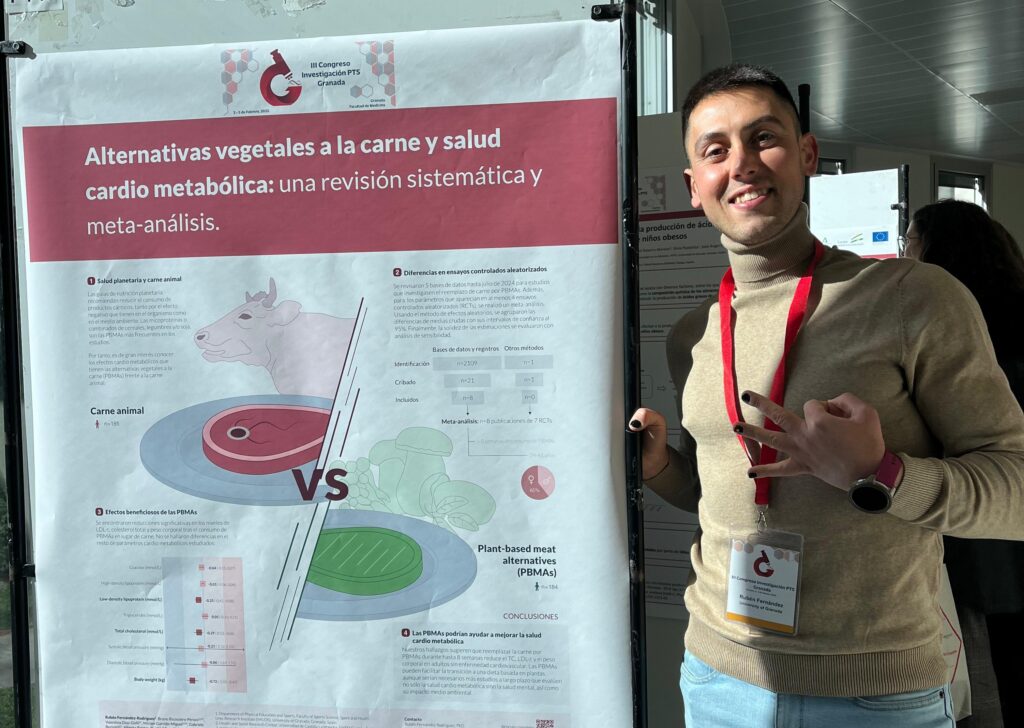Meet the researcher: synthesising the evidence on plant-based meat and nutrition with Rubén Fernández-Rodríguez
A Netflix documentary inspired a groundbreaking piece of research into the nutritional impact of plant-based meat.
Este artículo también está disponible en español.
24 February 2025

Name: Rubén Fernández-Rodríguez
Job title: Postdoctoral fellow
Organisation: University of Granada
Alternative protein specialism: Plant-based nutrition
A Netflix documentary inspired a groundbreaking piece of research into the nutritional impact of plant-based meat.
Dr Rubén Fernández-Rodríguez, who researches nutrition at Spain’s University of Granada, was watching the hit You Are What You Eat: A Twin Experiment – in which 22 sets of identical twins were put on opposing omnivorous and plant-based diets – when he realised more detailed work was needed to investigate the impacts of dietary transitions.
The result was a systematic review and meta-analysis of randomised controlled trials – considered the ‘gold standard’ of research because it draws together all available evidence about a tested dietary intervention – published in The American Journal of Clinical Nutrition at the end of last year.

The analysis found that using plant-based meat to replace some conventional meat over up to eight weeks led to clinically significant reductions in LDL – or ‘bad’ – cholesterol, while there were no significant changes in levels of HDL – or ‘good’ – cholesterol, blood pressure or fasting glucose levels.
The findings also suggested that plant-based meat could benefit weight management, with small reductions seen in participants even over these short time frames.
Growing body of evidence
Rubén’s study adds to a small but growing body of research into the nutritional quality of plant-based meat, which was also explored in another systematic review by London School of Hygiene and Tropical Medicine researchers, which found this food scored highly in areas such as cholesterol reduction, weight loss and gut health.
These findings are particularly promising because they result from an easy intervention – replacing some of the meat in people’s diets like for like with a plant-based alternative, offering benefits without requiring significant changes in behaviour. This can also serve as a stepping stone to a broader consumption of plant-based whole foods.
However, Rubén stresses that – with only a tiny amount of research in this field – there is an urgent need for longer-term studies with larger samples to draw more meaningful conclusions about everything from weight management to cardiovascular and gut health, and says more government funding for this research should be made available.
Ultra-processed fears
Despite the growing evidence of its nutritional benefits, many people still consider plant-based meat to be an ultra-processed food (UPF) – and Rubén says scientists must play a role in shaping the discourse.
“We as researchers need to communicate to the public that these options might be processed, but this does not mean they have a negative impact on our health,” he said. “It’s always going to be better to consume legumes and whole grains, but plant-based meat needs to be compared with the meat products it’s intended to replace.”
He also believes plant-based meat’s impact on people’s mental health is an underexplored area ripe for investigation.
Research has previously demonstrated that better quality, plant-rich diets can lead to a larger hippocampus – the area of the brain associated with memory and learning – and he is keen to carry out a controlled trial looking at whether swapping conventional meat for plant-based meat would have any similar effects.
Food’s impact on well-being
The impact of diet on mental health was what drew Rubén, who says his research background makes him an ‘outlier’, into this field.
Initially trained as a physiotherapist, he began his doctoral thesis looking at the health benefits of pilates before becoming involved in the University of Castile-La Mancha’s Nuts4Brain project and, as he put it, turning himself into a nutritional researcher to delve into the effects food has on people’s well-being.
He has also worked with the University of Granada’s Professor Jonatan Ruiz, who has explored whether time-restricted dietary interventions – in which people only eat during specific periods – have any impact on participants’ cardiovascular health, particularly on those following a plant-rich Mediterranean diet. Rubén will examine previously published data to determine whether this approach has any environmental advantages.
His next move will take him to Australia, where he will work with Professor Felice Jacka, director of Deakin University’s Food and Mood Centre, on a project investigating Tasmanian schools that have introduced lunch programmes prioritising locally grown plant-based foods.
He will analyse the impact of this intervention on children’s mental and physical health, particularly its effects on their gut microbiomes, to provide data for policymakers about the value of rolling out the scheme more widely.
But for now, Rubén has found his research in the spotlight, with journalists writing about his systemic review – evidence, he says, of growing public interest in plant-based food.
“People are looking into the quality of their diets, and the new generation is really interested in adopting more plant-based dietary options,” he said. “We, as researchers, need to provide more information about its impacts. As always, with research, we need more funding, but I think this will come as people’s behaviour changes.
“The global plant-based food market is going to grow exponentially, and this is going to improve the quality, meaning we are going to have better, healthier options.”
Are you interested in getting involved in the science of plant-based food, cultivated meat and fermentation? Take a look at our resources or check out our science page.
If you’re a researcher:
- To find funding opportunities, check out our research funding database for grants from across the sector, and our research grants for funding available from GFI.
- Explore our Advancing Solutions initiative, which highlights key alternative protein knowledge gaps.
- Subscribe to the alternative protein researcher directory to find potential collaborators or supervisors in the field.
- Look out for monthly science seminars run through our GFIdeas community.
If you’re a student:
- Find educational courses around the globe through our database.
- Sign up for our free online course introducing the science of sustainable proteins, explore our resource guide explaining what is available to students or newcomers to the space, and check out our careers board for the latest job opportunities in this emerging field.
